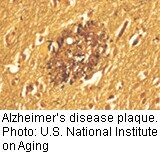
THURSDAY, March 14 (HealthDay News) — In an effort to quickly develop drugs that could prevent or slow Alzheimer’s, the U.S. Food and Drug Administration said it plans to relax the approval process for experimental medications for the memory-robbing disease.
In a proposal published online in the March 14 issue of the New England Journal of Medicine, the FDA said clinical trials of people in the early stages of Alzheimer’s would only need to show improvement in tests of thinking and memory. Among these patients, who are only starting to show subtle mental declines, improvements in daily functioning would not have to be seen, The New York Times reported.
The FDA’s goal is to speed development of drugs to treat a disease that has no cure, so that the millions of aging baby boomers at risk for Alzheimer’s might be able to prevent or slow the degenerative disease. The FDA is taking comments on the proposal, and will possibly make revisions, but the plan is going forward, agency officials said.
Drug companies would still be required to do post-marketing studies on any approved drugs, to confirm their benefits and safeguard against any potential harms from long-term use of these medications.
More than 5 million Americans are living with Alzheimer’s, according to the Alzheimer’s Association, which translates into one in eight seniors.
And those numbers are expected to swell in the next 20 years, according to the U.S. National Institute on Aging (NIA). The 65-and-older population is expected to double to about 72 million in two decades, and the number of people with Alzheimer’s doubles for every five-year interval past age 65, studies have shown. The number of the very elderly, age 85 and older, is estimated to triple by 2050, the NIA added.
More information
For more on Alzheimer’s disease, go to the U.S. National Library of Medicine.

